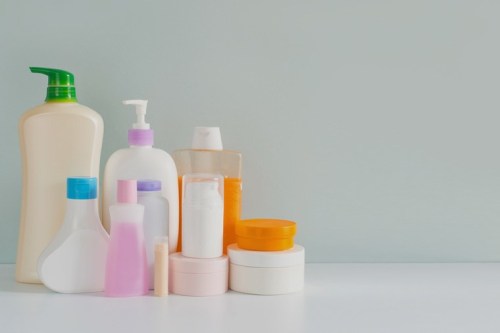I’ve said it before and I’ll say it again: Fighting acne is not just a topical situation (unfortunately). From what you put in your breakfast smoothie to your sleep habits, a range of lifestyle factors have an impact on the glow level of your skin.
That’s why you get different advice from different experts: While your dermatologist might not recommend that you cut dairy, for instance, a nutritionist isn’t about to suggest a serum for your skin type.
Because of the various factors that affect your complexion, I tapped a pro from every pillar of your skin-care routine for their top tips, so you can attack acne from all fronts—once and for all. Consider this your definitive guide.
Keep reading for how to get that enviable complexion, according to four skin experts.

The dermatologist
From a dermatologist’s perspective, knowledge is power. Follow these three pro steps to make sure you’re covering your bases.
Get to the root“Trying to determine the cause of your acne is crucial,” says Renee Snyder, M.D. and co-founder of W3ll People. “Ask yourself if your flare-ups are related to certain times of the month—[meaning they’re] hormonal—or after a particularly high carbohydrate meal. Certain foods that have a high glycemic index can trigger breakouts.”
Look at your labelsAccording to Dr. Snyder, some acne comes from your beauty products. “Heavy makeup containing petroleum, or petroleum byproducts like dimethicone and silicone, can cause congestion and micro-comedones that can lead to acne,” she says. (To take a further investigative dive into your breakouts, check out Well+Good’s guide to face mapping.)
Start with the basicsWhichever the case may be, Snyder advises that all regimens should begin with a gentle cleansing of the skin. And don’t forget to exfoliate. “Manual exfoliation helps to clear the pores from the dirt and oil of the day,” she says. “I’m a big fan of May Lindstrom Clean Dirt and Arcona Cranberry Grommage.”
And not all exfoliation has to be physical—you can also opt to use gentle vitamin A (AKA retinol) products as part of your nighttime ritual. “I like those from Arcona or Marie Veronique,” Snyder adds.

The nutritionist
It’s hard to achieve that coveted glow if you’re not eating the right nutrients—healthy skin comes from the inside out, after all. Here’s where you should start, according to a food pro.
This Parisian Skincare Brand Is Launching in the United States for the First Time—Here’s What a Derm Wants You to Know

We’re Calling It: Cleansing Balms Are the Face Wash of the Future—Here Are 3 to Add to Your Cart

This Is the One Product That Scarlett Johansson Always Keeps in Her Purse and on Her Bedside Table

Eat the rainbow“When trying to get clear skin, you should never underestimate the importance of what you eat,” says Stacy Goldberg, MPH, RN, BSN, Nutrition Consultant, CEO and founder of Savorfull. “A skin-friendly diet should focus on dark, leafy greens and getting a variety of color in fruits and vegetables.”
And while sufficient hydration may seem obvious, she reiterates that it’s essential. “Without proper hydration, toxins have a hard time being removed and symptoms like skin irritation, inflammation, and redness can occur,” says Goldberg.
Supplement with vitaminsShe also advises to get plenty of vitamins—both internally and topically. “Get your daily recommended allowances of vitamin A through foods such as sweet potatoes or carrots,” says Goldberg. “When used on the skin, lotions containing vitamin A can help control acne.”
The list goes on: vitamin B, “which contains the nutrient biotin which gives your skin a healthy glow,” says Goldberg; vitamin C, which can help with collagen production; vitamin E, “to keep the skin looking supple and soft.” Healthy fats are key as well—”omega-3-rich foods can assist in reducing inflammation, which can subside acne flare-ups,” she says.
What to avoid“There is some evidence that suggests that diets containing high-glycemic loads may be related to acne,” she says. “Also, limit consumption of dairy products—the hormone IGF-1, which is naturally present in dairy, is behind several skin problems.” (I’ll co-sign that: Cutting dairy did clear up this editor’s skin.)

The facialist
One building block to a clear complexion is a good facial plan, which preps your skin to absorb glow-boosting ingredients in good-for-you products. Here’s how you take your topical approach to the next level.
De-clutter your shelvesIt’s time to Marie Kondo your bottle and jar collection. “Try and get rid of the products you’ve had for a long time, are confused about, or are causing you stress,” says Cara Peloso, facialist and healer at CAP Beauty. “You just want to be focused on the products that truly work for you. Once you find the right regimen, be consistent.”
What doesn’t work? Peloso says to watch out for prescription acne treatments and strong topicals containing alpha and beta-hydroxies or antibiotics. “These dry your skin out and lead to premature aging,” she warns. There are DIY solutions for pimples that actually work, anyways.
Hydrate in layersThe most important part of your skin-care routine, according to Peloso, is to keep your skin hydrated and moisturized. “What’s really good for that are lightweight serums, especially those with hyaluronic acid and probiotics,” she says. “And don’t be afraid of layers: After cleansing and toning, put an intensive barrier serum followed by a restore serum or oil, then a light moisturizer. You want to look for serums that support the bacteria on your skin.” This in turn will help clear your pores without over-drying.
Get extra helpFor that extra oomph when you’re breaking out, Peloso says retinol and seaweed masks are helpful. “Retinol clears your pores because of all the cellar renewal,” she says. “And doing weekly seaweed masks is also really beneficial as they reduce redness.”
And, of course, don’t forget to wear sunscreen. “Zinc oxide is anti-inflammatory, and acts as a physical barrier—which is great in the winter,” says Peloso.

The skin-care guru
After researching for a decade how to deal with her cystic acne, Mahalo Skin Care founder Maryna Kracht discovered the number one culprit: inflammation. Here’s how to deal.
Go botanical“Avoid inflammation-causing foods and chemically laden beauty products—these wreak havoc on your hormonal balance, which in turn can strongly affect the health of your skin,” says Kracht. A proper botanical-based regimen that’s rich in anti-inflammatory actives will offer optimal nutrient synergy to balance your skin and give you long-term results.”
To battle acne-causing inflammation, Kracht advises using facial masks, oils, and non-foaming cleansers. “Using raw, organic honey as a quick treatment has helped me for years,” she says. “Try this two to three times a week to help soothe blemishes.” (Or try this editor-approved hack of replacing your face wash with honey.)
Lock in moistureKracht recommends that you always apply facial oils or balms to damp skin. “This is very important in keeping the skin hydrated,” she says. Also, look for oils and serums with healthy fats. “Acneic skin often shows lack of essential fatty acids, and will respond most favorably to facial oil serums or facial balm treatments [with them] to bring balance to it,” she adds.
Fresh bedding is bestOther pro tips you might not think about? “Wash your pillowcase every two to three days,” says Kracht. “I use one with silver threads that helps in keeping acne inflammation at bay.”
And ultimately, don’t be too harsh on yourself. “Give your skin love and give it the nourishing tools that allow it to properly rebuild and recover itself,” she says. “Remember, you are beautiful!” That’s the most important thing, after all.
It’s essential to have a positive outlook about your complexion—skin-shaming is a real thing, and this editor is so over it. And you can always sip on these teas for seriously radiant skin.
Sign Up for Our Daily Newsletter
Get all the latest in wellness, trends, food, fitness, beauty, and more delivered right to your inbox.
Got it, you've been added to our email list.








